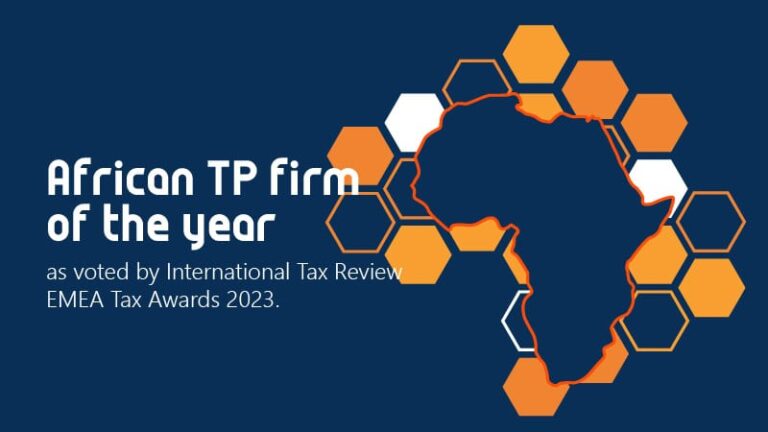African and OECD TP updates: June 2025
A round-up of transfer pricing and related updates from around the African continent and beyond.
(Sources: reports issued by organisations, government documents and legislation (where available) or other tax news platforms, such as Orbitax, MNETax, etc.)
OECD updates
OECD BEPS Action 14 update – March 2025
On 4 March 2025, the OECD released the latest peer review results under BEPS Action 14, highlighting progress in making tax dispute resolution more effective across participating jurisdictions. The reviews assess the implementation of the Mutual Agreement Procedure (MAP), which is key to resolving tax treaty-related disputes.
A new assessment methodology was adopted in December 2022. It includes a simplified peer review process for jurisdictions with limited MAP experience and a full peer review for those with substantial experience. The simplified process aims to help countries build strong MAP frameworks in anticipation of rising caseloads.
The third batch of simplified peer review reports covers ten jurisdictions: Benin, Burkina Faso, Dominica, Grenada, Iceland, Montenegro, Peru, Saint Lucia, Samoa, and Senegal. Key findings include:
- Several jurisdictions, including Burkina Faso, Iceland, Peru, and Senegal, have signed the Multilateral Instrument (MLI), aligning their treaties with the Action 14 minimum standard.
- Peru has adopted a documented bilateral notification and consultation process for MAP cases.
- Iceland, Peru, and Senegal have either met the target of resolving MAP cases within 24 months or have sufficiently resourced their competent authorities.
- Jurisdictions such as Dominica, Grenada, Montenegro, Saint Lucia, Samoa, and Senegal ensure access to MAP in all eligible cases and implement MAP agreements regardless of domestic time limits.
- Iceland, Peru, and Samoa have issued or updated public MAP guidance.
- These developments show a continued commitment to improving tax certainty and strengthening international tax cooperation.
Global Forum reports record-breaking capacity-building and outreach in 2024
The OECD’s Global Forum on Transparency and Exchange of Information for Tax Purposes reported unprecedented levels of capacity-building and outreach activities in 2024. These efforts are part of the Forum’s mission to promote tax transparency and combat tax evasion through international cooperation.
Key highlights:
- Training and support: The Global Forum provided extensive training and technical assistance to member jurisdictions, enhancing their ability to implement international tax standards effectively.
- Outreach initiatives: The Forum expanded its engagement with non-member countries, encouraging broader adoption of tax transparency principles and practices.
- Impact: These capacity-building efforts have strengthened global tax compliance frameworks, enabling jurisdictions to better detect and deter tax evasion and avoidance.
The Global Forum remains committed to supporting countries in building robust tax systems and fostering international collaboration to ensure a fair and transparent global tax environment.
OECD releases 2023 peer review reports on tax information exchange under BEPS Action 5
In February 2025, the OECD published the 2023 peer review reports evaluating jurisdictions’ compliance with the BEPS Action 5 minimum standard on the compulsory spontaneous exchange of information on tax rulings. This initiative aims to enhance transparency and combat harmful tax practices globally.
Key highlights:
- High compliance rate: Out of the jurisdictions reviewed, 104 were found to be fully compliant with the Action 5 minimum standard, reflecting a strong global commitment to tax transparency.
- Areas for improvement: The remaining 32 jurisdictions received a total of 56 recommendations to enhance their legal or operational frameworks for identifying relevant tax rulings and ensuring timely information exchange.
- Focus areas: The peer reviews assessed five key elements: the information gathering process, exchange of information, confidentiality of the information received, statistics on the exchanges of rulings, and transparency on certain aspects of intellectual property regimes.
OECD releases latest peer review results on preferential tax regimes under BEPS Action 5
In February 2025, the OECD released the latest peer review results assessing preferential tax regimes under BEPS Action 5, as conducted by the Forum on Harmful Tax Practices (FHTP). This initiative aims to identify and address tax regimes that may facilitate base erosion and profit shifting (BEPS) and to promote fair tax competition globally.
Key highlights:
- New regime assessments: The FHTP evaluated eight preferential tax regimes, concluding that several, including those in Barbados (patent box), Croatia (Investment Promotion Act), Fiji (revised ICT incentives), and Hong Kong (IP regime), are “not harmful” and comply with the Action 5 minimum standard.
- Regimes under review: Certain regimes, such as Fiji’s original ICT incentives and Malaysia’s digital tax incentives, remain under review pending further analysis.
- Abolished regimes: Trinidad and Tobago’s free trade zones regime has been abolished, with the grandfathering period ending on 31 December 2024.
- Substantial activities requirements: The FHTP completed its fourth annual monitoring of substantial activities requirements in jurisdictions with no or only nominal tax. This monitoring ensures that entities in these jurisdictions have adequate economic substance, aligning with the BEPS Action 5 standard.
Since the inception of the BEPS Project, the FHTP has reviewed a total of 332 regimes, with over 40% being abolished or in the process of being abolished, reflecting significant progress in curbing harmful tax practices.
Practical Implications of Pillar Two Compliance – Latest OECD Guidance
In January 2025, the OECD released updated guidance on the implementation of the Global Anti-Base Erosion (GloBE) rules under Pillar Two, providing clarity on several key aspects of the framework. This guidance aims to assist multinational enterprises (MNEs) and tax administrations in applying the rules consistently and effectively.
Key highlights:
- Scope and applicability: The guidance reaffirms that the GloBE rules apply to MNEs with consolidated revenues of at least €750 million, aligning with the threshold set for Country-by-Country Reporting.
- Effective tax rate (ETR) calculation: Clarifications are provided on the computation of the ETR, including the treatment of deferred tax assets and liabilities, and the allocation of taxes among constituent entities.
- Safe harbours and simplifications: The OECD introduces transitional safe harbour provisions to ease the initial compliance burden, allowing MNEs to use simplified calculations under certain conditions.
- Administrative guidance: The document offers detailed instructions on the filing obligations, data collection, and documentation requirements necessary for compliance with the GloBE rules.
The updated guidance is intended to facilitate the consistent application of the GloBE rules and to support MNEs in navigating the complexities of the new international tax landscape.
OECD updates Main Documentation Package for MNEs participating in ICAP risk assessments
On 29 January 2025, the OECD Forum on Tax Administration released updated templates and guidance for the Main Documentation Package required from multinational enterprises (MNEs) participating in the International Compliance Assurance Programme (ICAP). This package is submitted after the selection stage and before the commencement of the risk assessment phase.
Key updates:
- New templates introduced: The OECD provided standardised templates for the Main Documentation Package, including a comprehensive checklist and a Covered Transactions Schedule.
- Elimination of CbCR self-assessment: The requirement for a Country-by-Country Reporting (CbCR) self-assessment as part of the Main Documentation Package has been removed, simplifying the submission process.
Components of the Main Documentation Package:
- Checklist: Outlines the documents to be submitted, such as:
- Updates to any previously provided documentation.
- Transfer pricing Local Files for all covered periods.
- Audited consolidated financial statements for all covered periods.
- The MNE group’s tax strategy and Tax Control Framework (if documented).
- Value chain analysis for the MNE group.
- Permanent establishment documentation.
- Covered Transactions Schedule: A detailed spreadsheet capturing information on each covered transaction, including:
- Legal entities involved and their tax identification numbers.
- Countries of tax residence.
- Descriptions of transactions and applicable transfer pricing methods.
- Benchmarking ranges and tested parties.
- Actual results and explanations for any changes between covered periods.
Implications:
These updates aim to streamline the ICAP process, reduce administrative burdens, and enhance clarity for participating MNEs. By standardising documentation requirements and removing the CbCR self-assessment, the OECD facilitates a more efficient risk assessment process, promoting greater tax certainty and cooperation between MNEs and tax administrations.
OECD publishes Consolidated Report on Amount B under Pillar One
In February 2025, the OECD released the Consolidated Report on Amount B, a significant component of Pillar One of the OECD/G20 Inclusive Framework on Base Erosion and Profit Shifting (BEPS). This report aims to simplify and streamline the application of the arm’s length principle to in-country baseline marketing and distribution activities, particularly benefiting low-capacity jurisdictions.
Key features:
- Simplified approach: Amount B introduces a standardised method for pricing qualifying transactions, reducing the need for complex transfer pricing analyses and minimising disputes.
- Scope of application: The approach applies to distributors and sales agents engaged in routine marketing and distribution activities, excluding those dealing with non-tangible goods, services, or commodities.
- Implementation timeline: Jurisdictions can apply Amount B to in-scope transactions for fiscal years beginning on or after 1 January 2025.
- Integration into guidelines: The guidance has been incorporated into the OECD Transfer Pricing Guidelines for Multinational Enterprises and Tax Administrations, providing a consistent framework for application.
The Consolidated Report on Amount B represents a collaborative effort to enhance tax certainty, reduce compliance costs, and support the effective allocation of taxing rights in the digitalised economy.
OECD Secretary-General’s Tax Report to G20 Finance Ministers and Central Bank Governors
In February 2025, the OECD released a comprehensive report detailing recent developments in international tax cooperation, presented ahead of the G20 Finance Ministers and Central Bank Governors meeting in Cape Town, South Africa. The report underscores the OECD’s commitment to supporting G20 priorities, including the implementation of the BEPS minimum standards, the Two-Pillar Solution addressing tax challenges from digitalisation, and enhancing tax transparency.
Key highlights:
- Two-pillar solution progress: Significant strides have been made in finalizing the Multilateral Convention (MLC) to implement Amount A of Pillar One, with only one jurisdiction objecting to its adoption as of June 2024. Efforts continue to resolve outstanding issues related to the Amount B Framework.
- BEPS implementation: The OECD continues to assist jurisdictions in implementing the BEPS minimum standards, focusing on combating harmful tax practices, preventing treaty abuse, and improving dispute resolution mechanisms.
- Tax transparency enhancements: The Global Forum on Transparency and Exchange of Information for Tax Purposes has expanded its standards to include information on real estate ownership, enhancing cross-border access to beneficial ownership data.
- Transfer pricing developments: Ongoing work on BEPS Actions 8-10 has led to substantial revisions in the OECD Transfer Pricing Guidelines, aiming to align transfer pricing outcomes with value creation.
- Addressing tax and inequality: The OECD emphasises the role of tax policy in addressing inequality, advocating for progressive tax systems and effective redistribution mechanisms.
- Digital transformation in tax administration: The report highlights the importance of digital tools and data analytics in modernising tax administrations, improving compliance, and enhancing taxpayer services.
- Support for developing countries: The OECD continues to support developing countries through capacity-building initiatives, technical assistance, and the development of toolkits to aid in the implementation of international tax standards.
Kenya
Kenya introduces domestic minimum top-up tax under BEPS Pillar Two
On 27 December 2024, Kenya enacted the Tax Laws (Amendment) Act, 2024, introducing a Qualified Domestic Minimum Top-Up Tax (QDMTT) effective from 1 January 2025. This move aligns Kenya with the OECD/G20 Inclusive Framework on Base Erosion and Profit Shifting (BEPS) Pillar Two, aiming to address tax challenges posed by the digital economy and profit shifting by multinational enterprises (MNEs).
Key features:
- Scope: Applies to MNEs with annual consolidated revenues of at least €750 million (approximately KES 95 billion) in at least two of the previous four accounting periods.
- Objective: Ensures that in-scope MNEs pay a minimum effective tax rate of 15% on income generated in Kenya, thereby reducing the risk of profit shifting to low-tax jurisdictions.
- Mechanism: The QDMTT allows Kenya to impose a top-up tax to bring the effective tax rate on domestic profits up to the 15% minimum before other jurisdictions apply the Income Inclusion Rule (IIR) or the Undertaxed Profits Rule (UTPR).
Detailed regulations and guidance from the Kenya Revenue Authority are anticipated to clarify the implementation and compliance requirements of the QDMTT.
Kenya Revenue Authority urges taxpayers to use tax amnesty programme
The Kenya Revenue Authority (KRA) is encouraging taxpayers to take advantage of the ongoing tax amnesty programme, which aims to provide relief to individuals and businesses with outstanding tax liabilities. The program offers an opportunity for eligible taxpayers to regularise their tax affairs by settling principal tax amounts while benefiting from the waiver of penalties and interest accrued up to a specified date.
Key aspects:
- Eligibility: Taxpayers with outstanding tax liabilities, including penalties and interest, incurred up to a certain cutoff date are eligible to apply for the amnesty.
- Benefits: Upon successful application and settlement of the principal tax amount, the KRA will waive the associated penalties and interest, thereby reducing the overall tax burden on the taxpayer.
- Application process: Taxpayers are required to submit their applications through the prescribed channels, providing accurate and complete information to facilitate the processing of the amnesty.
The KRA emphasises the importance of timely compliance and urges taxpayers to seize this opportunity to regularise their tax status, avoid enforcement actions, and contribute to national development.
Kenya ratifies OECD Multilateral Instrument to enhance tax treaty network
In February 2025, Kenya deposited its instrument of ratification for the OECD’s Multilateral Convention to Implement Tax Treaty Related Measures to Prevent Base Erosion and Profit Shifting (MLI). The MLI entered into force for Kenya on 1 May 2025.
Key implications:
- Enhanced tax treaty network: By ratifying the MLI, Kenya aims to strengthen its tax treaty network, making it more robust against base erosion and profit shifting (BEPS) activities.
- Implementation of BEPS measures: The MLI allows Kenya to swiftly incorporate BEPS-related measures into its existing tax treaties without the need for bilateral negotiations.
- Alignment with international standards: This move aligns Kenya with international efforts to promote tax transparency and combat tax avoidance, enhancing its reputation as a cooperative jurisdiction in global tax matters.







